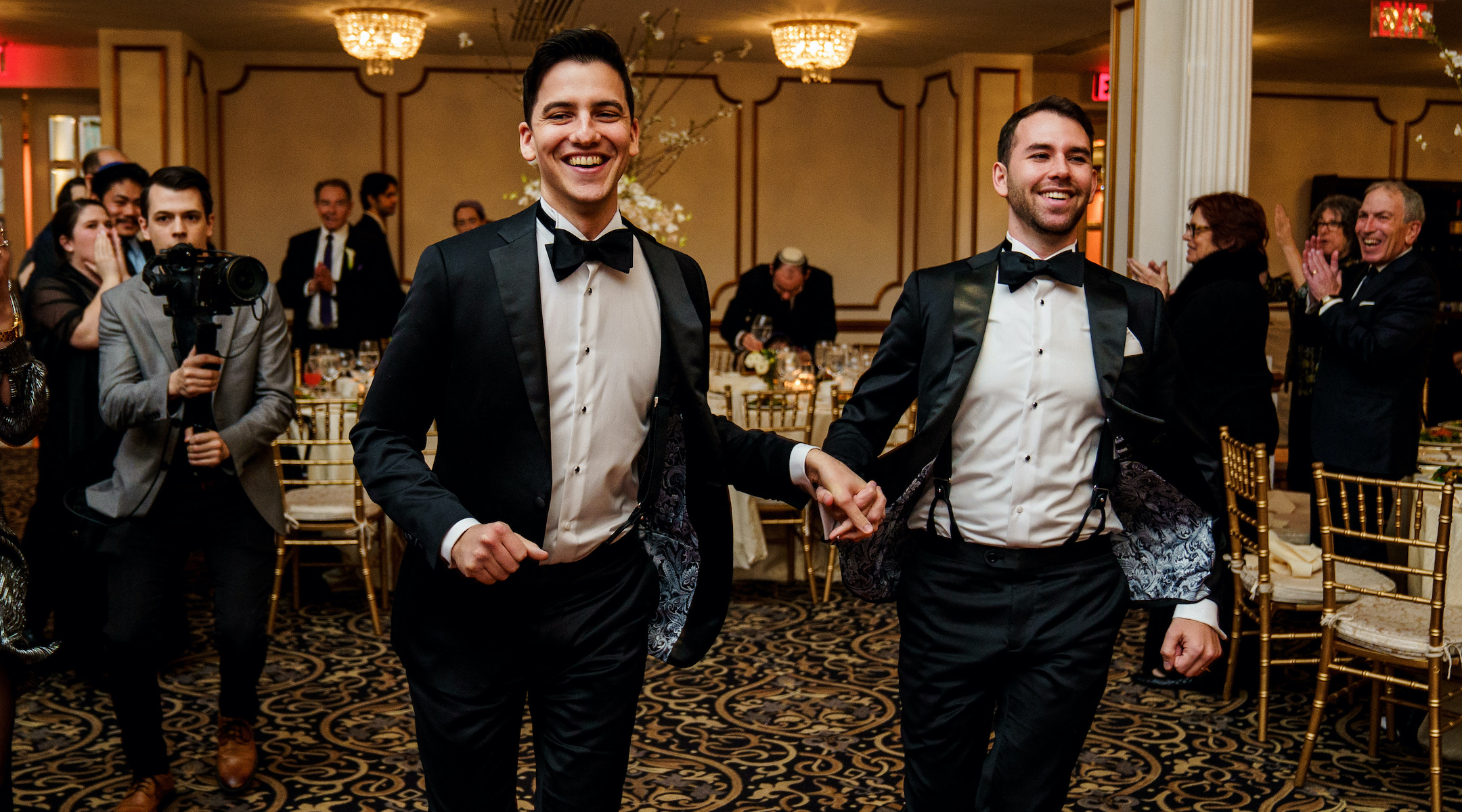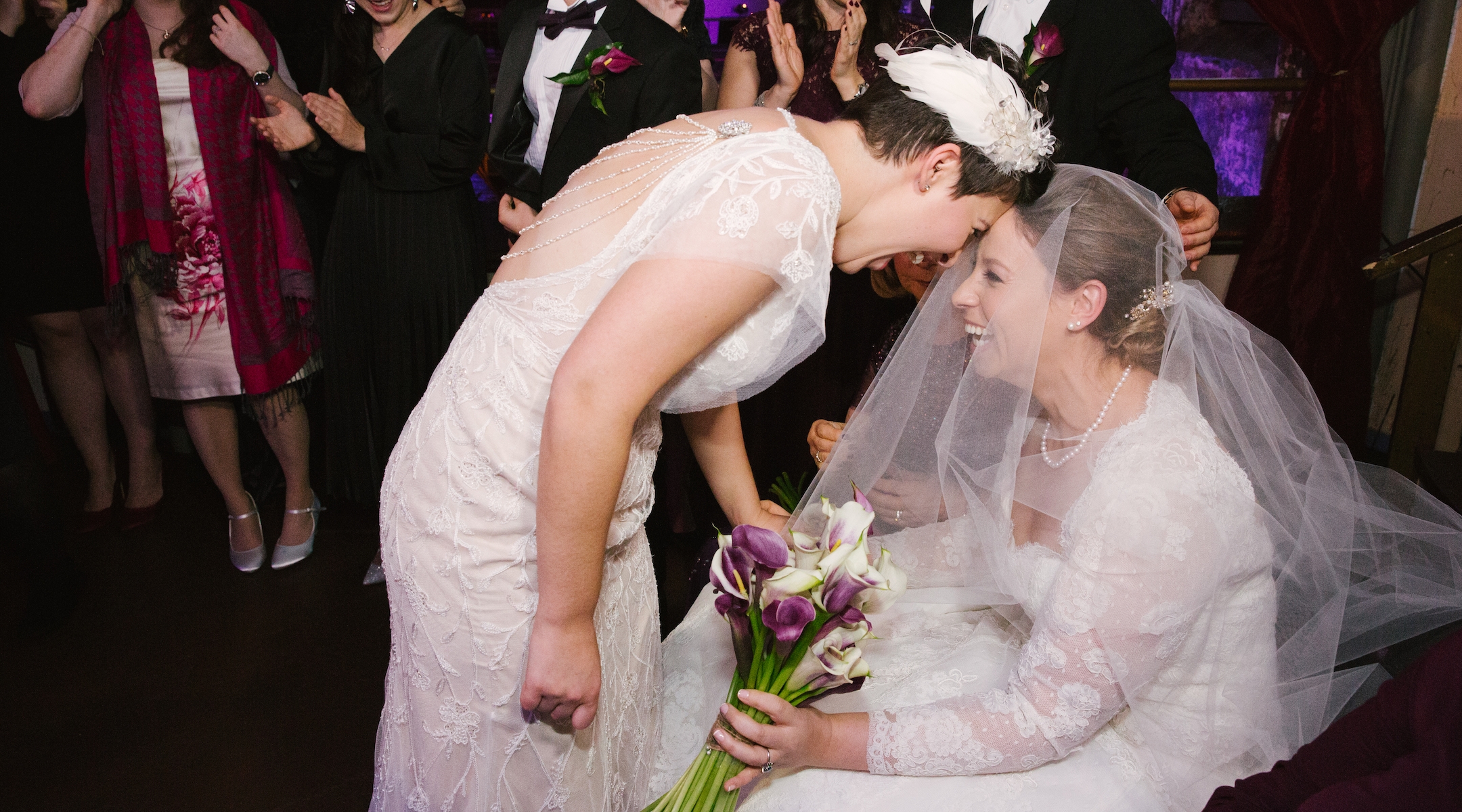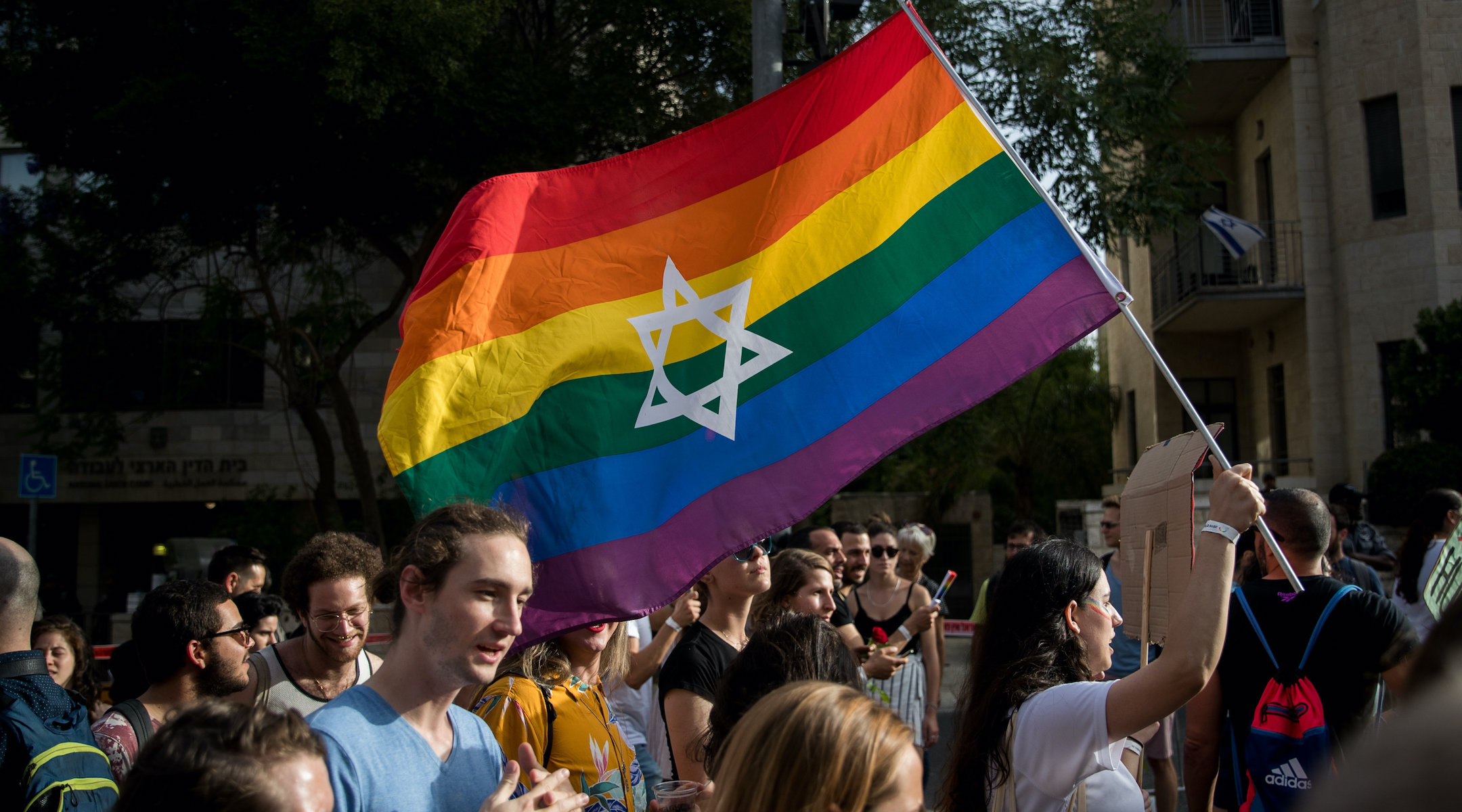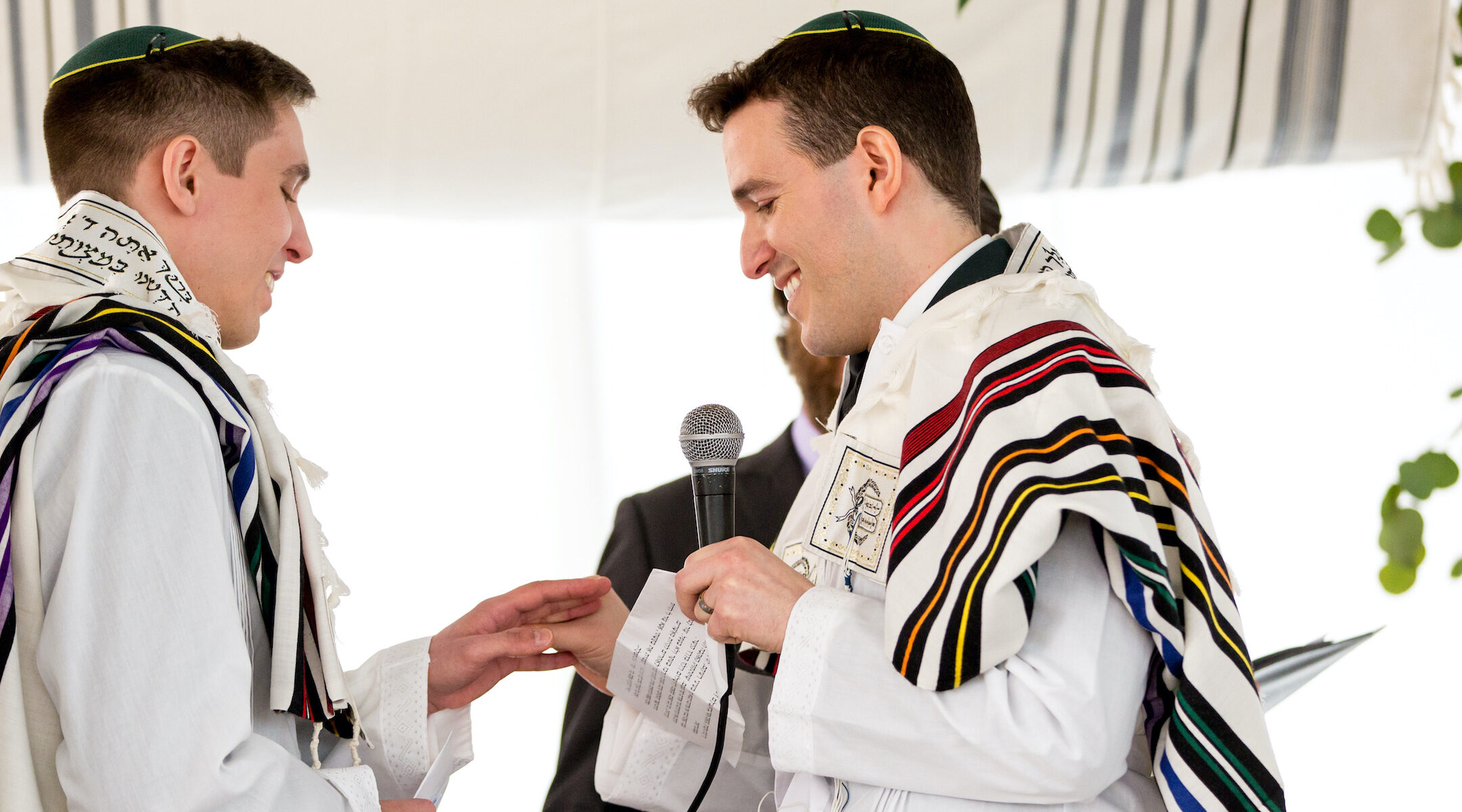(JTA) — As a teen, Nadiv Schorer felt a deep sense of grief when attending his older siblings’ weddings. After he realized he was attracted to men, he thought there was no way for him to build a life in the Modern Orthodox community, where he had been repeatedly told there was no space for gay people.
“I remember realizing I’m never going to have this,” he recalled. “And it was very difficult for me.”
Yet earlier this year, Schorer stood with his now-husband, Ariel Meiri, under the chuppah in a ceremony that didn’t look too different from the ones his brothers and sisters had. Officiating at the ceremony was Rabbi Avram Mlotek, an Orthodox rabbi who leads an outreach organization for young Jewish professionals in New York. It was Mlotek’s first time performing a same-sex wedding.
“If the couple is choosing to live Jewish lives, build a Jewish home and raise Jewish children, our traditional rabbinate must seize the opportunity to welcome and work with these families at their most precious life-cycle moments,” Mlotek wrote last year in announcing his decision to perform same-sex weddings. “If we don’t, we risk further alienation and falling into an abyss of religious irrelevance by denying these couples their rightful place of belonging.”
Mlotek is part of a growing cadre of Orthodox rabbis who are breaking ranks by performing wedding ceremonies that until recently had been unthinkable in the Orthodox Jewish world. The Jewish Telegraphic Agency was able to identify 10 Orthodox-ordained rabbis who have performed or said they were open to officiating religious wedding ceremonies for same-sex couples. Though small, that number represents a remarkable change in the Orthodox community, which is defined by its strict adherence to religious law and in which a decade ago it was impossible to find a single rabbi willing to do so.
“I think for most Orthodox rabbis, the prohibition in the Bible and in subsequent halachic works was somewhat intractable,” said Jonathan Sarna, a professor of American Jewish history at Brandeis University, referring to the biblical prohibition on sex between men. “But what we do see, which I think is very important, is a change of attitude.”
The rabbis identified by JTA include prominent figures like Rabbi Asher Lopatin, the former head of the liberal Orthodox rabbinical school Yeshivat Chovevei Torah, who said he would “seriously favorably consider it” if asked to perform a same-sex wedding.
“The Judaism that I believe in, that I think God gave us, is one that cares for people and addresses their needs and is meaningful for them, so Jewish law and Jewish tradition needs to address this,” said Lopatin, who leads a Modern Orthodox synagogue outside Detroit as well as the Jewish Community Relations Council in Detroit.
In addition to Mlotek and Lopatin, the other rabbis are Daniel Atwood, Elie Friedman, Gabe Greenberg, Steven Greenberg, Daniel Landes, Sarah Mulhern, Aaron Potek and Shmuly Yanklowitz.
Some of them were ordained at Yeshiva University, the Modern Orthodox rabbinical school that recently rejected the formation of an LGBTQ student group. Others were ordained by Yeshivat Chovevei Torah, which was embroiled in controversy last year when it declined to ordain a gay student. That student, Atwood, was ordained by Landes instead, as was Mulhern, who had previously graduated from a non-denominational rabbinical school.
Orthodox Judaism is defined by its traditional interpretation of Jewish law, which does not allow same-sex marriage or sexual relations between people of the same gender. Attitudes toward same-sex marriage and LGBTQ acceptance in general are similar in the more conservative haredi Orthodox world, which maintains a strict separation from the secular world. But in the Modern Orthodox community, where a religious lifestyle is balanced with an embrace of the secular world, LGBTQ acceptance has accelerated.
That has left some Modern Orthodox-ordained rabbis concluding that prohibitions, such as the oft-cited passage from Leviticus that has traditionally been interpreted as calling gay male sex “an abomination,” need to be reevaluated.
“I view that prohibition and set of related prohibitions as an area of Torah law that is in tension with other Torah values, including the value of all life and the value of saving a life. Knowing what we know about suicide rates in the gay community, I think that’s highly relevant,” said Rabbi Gabe Greenberg, who officiated his first same-sex wedding last year.
The number of Orthodox-ordained rabbis performing same-sex weddings may be set to expand even further. Around 45 rabbis attended a series of sessions that started in 2018 to explore how a same-sex wedding might look in an Orthodox setting. The conversations were hosted through Torat Chayim, a progressive Orthodox rabbinic group led by Yanklowitz, who has not performed a same-sex wedding but says he is “very open” to doing so.
“It’s been an issue that has really had a lot of movement within the Jewish community and the Orthodox community. In the progressive Orthodox world there’s a lot of receptivity,” Yanklowitz said.
Though the Orthodox movement lags far behind the other Jewish denominations — all of which allow same-sex weddings and queer rabbis — LGBTQ people are seeing more acceptance at a community level, especially in Modern Orthodox synagogues, said Rabbi Zev Eleff, an associate professor of Jewish history at Touro College who researches American Orthodox Judaism.
“Twenty years ago, when somebody came out of the closet, a man who wanted to marry a man or a woman who wanted to marry a woman, if they came to that decision they also came to that decision they had to leave Orthodoxy. Now while they may never become president of their synagogues, at the same time they can make peace with their family lifestyle and finding outlets, like certain Orthodox schools and certain Modern Orthodox congregations,” Eleff said.
Recently, Rabbi Benny Lau, a prominent Israeli Orthodox rabbi released a statement that seemed to offer a path forward to same-sex couples looking to build their lives in the religious world. Though the rabbi did not offer a framework for a wedding ceremony, he said that the impulse to marry and have one’s relationship publicly affirmed should not be ignored and that Judaism does not forbid gay couples from building families.
And though no American Jewish Orthodox group has endorsed same-sex weddings, queer couples are finding support among friends and family.

Jeremy Borison, right, and Michael Greenberg tried to stick as close to tradition as possible for their wedding. (Nyla Grey)
“Is the Modern Orthodox community ready for something like this? We had almost 300 people at our wedding, at least two thirds of whom were from the Orthodox communities in Cleveland, New York and Los Angeles. We know not everyone is this fortunate but clearly some in the Orthodox community are ready for this,” said Jeremy Borison, who wed his husband in an Orthodox ceremony officiated by Rabbi Elie Friedman earlier this year.
For same-sex couples seeking to have an Orthodox wedding, one hurdle is how to navigate a ritual ceremony crafted for heterosexual couples. In a traditional Jewish wedding, two witnesses sign a ketubah, a marriage contract for the couple that outlines the husband’s responsibilities to the wife. Then, in the betrothal ceremony, known as kiddushin, the groom “acquires” the bride by giving her a ring and reciting a formula. During the marriage ceremony, nissuin, seven blessings are recited over the couple — including two that use language that refer specifically to a groom and bride.
Some same-sex Orthodox couples choose to hew as closely as possible to that template. Borison and his husband Michael Greenberg wanted to stay as close to tradition as possible, only altering the Hebrew text so that it referred to two grooms rather than groom and bride and using two ketubahs — rather than one, since the text is one-sided and talks about the husband’s responsibilities to the wife.
Others are relying on alternative models, feeling like the traditional wedding liturgy does not apply to same-sex couples.
“We wanted it to be a traditional Jewish wedding and we also wanted to pay homage to our queer identities, and queer culture. We didn’t want to do the exact same things that we would at a heterosexual wedding but change the pronouns,” said Rabbi Daniel Atwood of his 2019 wedding to husband Judah Gavant.
To do so, the couple worked with their officiating rabbi, Gabe Greenberg, drawing inspiration from a model created years earlier by Rabbi Steven Greenberg, who came out as gay after being ordained in 1983 and in 2011 became the first Orthodox-ordained rabbi known to have performed a same-sex wedding. (The two rabbis are not related.)
In place of a ketubah, Steven Greenberg’s ceremony consists of a “shtar shutafut,” a legal agreement that has historically been used for business partnerships. The idea to use such a partnership for a wedding was first proposed in 1999 by Rachel Adler, a Reform feminist rabbi who felt the language of a typical ketubah was sexist. (In recent years, many heterosexual couples have taken Adler’s lead in trying to make their wedding ceremonies more egalitarian.)
Steven Greenberg creates the document together with the couple to fit their relationship and it is read out loud during the ceremony. In place of kiddushin, which establishes monogamy and where the husband gives the wife a ring, Greenberg has both partners take vows to be exclusive to each other. In place of the traditional “sheva brachot,” Greenberg has friends and family come up and give the couple seven blessings of their choice.

Leana Tapnack, left, and her wife Sandy worked with Rabbi Sarah Mulhern to create a ceremony that felt similar to a traditional Orthodox one. (Gulnara Samoilova)
Sandy and Leana Tapnack had a similar vision for their 2018 wedding.
“We wanted something that felt on a gut level like the Orthodox weddings we had been to and that felt traditional. We also didn’t want to mess with halacha. We didn’t want to pretend something was halachic when it wasn’t. That didn’t feel authentic to us, and we didn’t want to feel like we were inventing something for the first time necessarily,” Leana Tapnack said.
Mulhern worked with the couple to craft a ceremony that used a “dual vow” mechanism — each woman promising to be monogamous with the other — rather than the traditional blessings said as part of kiddushin. Afterwards, they did a modified “sheva brachot” ceremony.
“It really felt aesthetically like a traditional Jewish wedding,” Mulhern said.
How couples design their ceremonies represents a tension about how change happens in the Orthodox world — whether tradition can be adapted or has to be rethought.
“I respect people who do an alternative and everyone’s entitled to do what they’re comfortable with, but I view it as a step in the wrong direction because it’s separate but equal,” said Michael Greenberg, whose wedding ceremony to Borison stayed as close to tradition as possible. “It’s formally not acknowledging a gay wedding as a wedding, they’re saying it’s something else. … They’re using the halachic mechanism of a partnership [shtar shutafut] to give some sort of halachic validity or halachic mechanics to a gay wedding but it’s not a [traditional] Jewish wedding.”
Friedman, the officiating rabbi, said the Jewish legal validity of the wedding is only one piece of what matters.
“What we were saying was that the ceremony itself and the sense of commitment to each other and to God and to the people who were there was meaningful enough in and of itself,” said Friedman, who has spoken in Orthodox Jewish settings about his experience as a gay man. “Even if we left up to Hashem the question of what its ultimate halachic meaning was, we still wanted to do it that way anyway.”
Not all progressive Orthodox rabbis are on board with same-sex weddings, even as they believe that queer Jews should be included in Orthodox communities.
Eleff, the professor at Touro College, says that while there has been increased acceptance of queer people in the Modern Orthodox world, weddings may be a step too far for many.
“It goes beyond the boundaries of how the Modern Orthodox negotiate halacha in modernity,” he said. “What it messages outwardly is the decision to conform halacha to modern sensibilities and Modern Orthodoxy has really eschewed that. It really has not tolerated that aggressive halachic decision making.”
Rabbi Gavriel Bellino’s congregation, Sixth Street Community Synagogue in downtown New York, welcomes queer members and has co-hosted a shabbaton with Eshel, a group for Orthodox Jews who are LGBTQ. Still, Bellino cannot see a way for Orthodox Judaism to offer a pathway to same-sex weddings.
“I feel limited by the mechanisms of Jewish law and so I have no mechanism to perform such a wedding,” he said. “So while the secular side of me and the progressive American in me is very much in favor of the legalization of same-sex unions, I don’t perform them in a religious context.”
That means that some queer Jews who grew up Orthodox are looking to other denominations when they plan their weddings.
“A lot of Orthodox LGBTQ Jews are finding their friends to conduct ceremonies or rabbis from other denominations. There are very few Orthodox-ordained rabbis who will do commitment ceremonies — very, very few. And while it’s nice to have a rabbi do it, I don’t think it’s necessary, and people have been doing it for decades without rabbis,” said Miryam Kabakov, the executive director of Eshel. Kabakov herself has officiated two same-sex weddings for Orthodox couples and consulted on others.
Others choose to leave Orthodoxy entirely, concluding that fighting to carve a space for themselves is not worth it when other denominations have made that space already.
Gedalia Robinson had a Conservative rabbi officiate his wedding to his husband Caleb this year. Though Robinson grew up deeply involved in the Modern Orthodox world — his father is Rabbi Menachem Penner, dean of Yeshiva University’s rabbinical school — he says he grew tired of having to constantly battle for acceptance.
“It was just very draining. It was trying to throw a rope across a ravine, to create a bridge and just throwing a very, very heavy rope very far, and often just being met with a person who just did not even extend their hands,” he said.
That fight has also pushed away some progressive Orthodox rabbis to leave the movement.
“There are just so few folks who are really willing to address that fundamental core problem in the Orthodox world that I decided for me personally, I didn’t need that denominational affiliation to ultimately address the question that I care most about … which is how do we believe that God and Jewish law and values wants someone who is born gay to live out their life,” said Rabbi Aaron Potek, who was ordained at Yeshivat Chovevei Torah and announced publicly last year that he no longer identified with Orthodoxy.
Potek said he had seen colleagues who sought to include LGBTQ people in their communities face pressure to “prove their Orthodoxy” after critics in the community accused them of having departed from Orthodox values. “I just didn’t care about that fight,” said Potek, who works at the nondenominational synagogue Sixth & I and is slated to officiate his first same-sex wedding next year.

Acceptance of LGBTQ people has accelerated in the Orthodox world, although some feel progress is too slow. (Yonatan Sindel/Flash90)
Others are feeling hopeful about creating more inclusive Orthodox communities.
“A number of Orthodox rabbis are now feeling confident enough in the halachic and life-affirming system of Orthodox Judaism that they can approach these issues with compassion and deep thought in order to come to resolutions of a heartbreaking situation,” said Rabbi Daniel Landes.
Landes, the rabbi who ordained Atwood, the openly gay student who was denied ordination by Yeshivat Chovevei Torah, is in the midst of that shift himself. In July, he said he was not yet ready to officiate a same-sex wedding. By September, he had changed course.
“I’m only doing weddings for students. The occasion for doing a same-gender wedding hasn’t yet arisen but — if we can agree on a proper liturgy — I can see it happening,” he said in an email. “I don’t turn my back on my students.”
He says he is still in the process of figuring out what a ceremony and a legal ruling on the issue would look like.
“Halachic rationale is needed and it’s also very possible because God cannot create a world that plunges certain of its members into sin that it cannot extract itself from,” he said. “How can we get there? I think I have a way.”
That kind of thinking has meant that queer Jews like Schorer are able to get married and imagine a future in the Orthodox world.
“Our wedding day was to me the most spiritually uplifting and emotional day that I have ever experienced in my life,” said Schorer, who belongs to an Orthodox synagogue with his husband. “And realizing that I was sort of being able to live my truth of who I am and marrying the man that I love in a way that is right for us — it was Jewish and traditional — it felt right.”
JTA has documented Jewish history in real-time for over a century. Keep our journalism strong by joining us in supporting independent, award-winning reporting.






